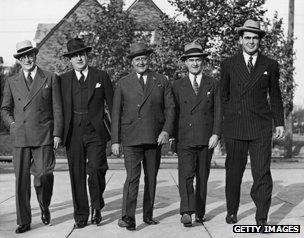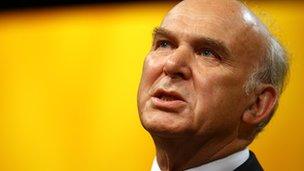Why is chief executives' pay not linked to performance?
- Published

In recent decades chief executive pay has risen exponentially compared to workers' salaries
Here is just one statistic: In 1978 the chief executive of British Aerospace was paid £29,000 a year.
In 2010, the chief executive of BAE Systems, Ian King, was paid over £2.3m, a rise of 8,000%.
Yet BAE is making up to 3,000 workers redundant, which under government defence procurement rules, the state will pay for.
So is it fair to pay Ian King millions while the taxpayer bears the cost of sacking the workers?
Alan Johnson is the MP for Hull West and Hessle where many of the BAE workers live.
He says executives are being generously rewarded for making the wrong decisions.
"I think it would be unacceptable even if BAE were making the right decisions. And if you look at their performance they haven't done that.
"They made a decision to get out of civil aviation," he adds. "It was completely the wrong call and workers in this country are suffering as a result of that."
BAE begs to differ. "Our CEO's pay is performance-based and in 2010 our performance against targets was good," it says. "Pay is set at the right level to enable the company to attract, motivate and retain the highest calibre of executives."
Executive pay used to be 30 or 40 times the wages of the lowest paid worker, now it is more like 300 or 400 times.
Rubbing backs
In what one could call an arms race for pay, how has executive compensation gone from large via massive to excessive?
By committee is the answer.
Executive pay in the biggest companies is set by a remuneration committee of non-executive directors.

Business Secretary Vince Cable wants to require shareholders to approve pay by a 75% majority
They have been criticised as being a cosy club of like-minded people.
At BAE, in common with other companies, the remuneration committee of three non-executive directors votes on the chief executive's annual pay and bonus.
And the CEO, in this case Ian King, sits on the committee that decides the non-executive pay levels and bonuses.
In effect they decide on each others' pay.
Les Wegg is one of the thousands of BAE workers facing redundancy.
"It's a nonsense isn't it? It smacks to me as a bit of a club, if you're going to be genuine about it you need properly independent people," he says.
BAE Systems say their remuneration committee's "report last year was highly commended for its transparency", and that the committee "seeks independent advice and uses externally validated data" to set policy.
Too much?
One of the main tasks of any remuneration committee is to make sure the chief executive does not leave.
The wider question of how much is too much is not their problem says remuneration consultant, Vicky Wright.
"Too much in relation to what? We need to recognise that some executives are really producing very, very good results and a lot of good executives create a hell of a lot of value.
"The question for a remuneration committee is have we really got a good chief executive?"
If the committee sets a pay award at 10% and a competitor company sets it at 11%, then next year, to keep their executives happy, the remuneration team might choose to raise pay by 12%.
It is a ratchet effect, whatever the company's performance.
Alan MacDougal from the Pensions Investment Research Council says that explains why over a 12-year period chief executive pay has quadrupled while share prices have been flat.
"There's a genuine bubble at the heart of our corporate culture. Several thousand people do not exist in the real world like the rest of us.
"Their lifestyles, their leisure, their socialising is not done in the same way as the rest of us.
"It develops a certain arrogance that we've seen displayed in relation to shareholder accountability," Mr MacDougal said.
Shareholders have the power to vote down executive pay awards at company annual general meetings, but in the last decade there have only been 18 such revolts in the UK.
Other priorities
With the exception of a minority of investors, most shareholders tend to vote on return on their investment and not on pay and bonuses.

Thomas Cook's share price nosedived but the chief executive got a £1m bonus
As long as share value is increasing, a revolt is unlikely, whatever the level of executive pay.
Business Secretary Vince Cable now wants to give shareholders more power to vote down excessive pay deals.
His proposals could mean private and institutional investors will only need a 25% vote to defeat a pay deal. At the moment it is 51%.
That will make it easier to achieve a majority amongst pension and hedge funds, asset managers and other investors to vote down a pay award.
That is a significant change.
Take the travel agent Thomas Cook. Former chief executive Manny Fontela-Novoa took the company's share price from 350p to just 50p in four years.
He was given a bonus of over £1m when he left.
Just three months after his departure the company was forced to borrow £200m to keep trading.
Even then only 39% of shareholders voted against the company's pay proposals.
Frank Meysman is the new chairman of Thomas Cook. He took over the day after Manny Fontela Novoa left.
Mr Meysman says shareholders are the wrong people to control pay, companies like his have to introduce bonus claw-backs and effective performance targets to manage salaries.
"A company should be run by the company. We should look much more at how can we limit the amount of money that somebody can receive when he or she under-performs," he told The Report.
While more shareholder power might help stop high pay for poor performance, Vince Cable's proposals are less likely to convince shareholders to take on high pay itself.
The Report is on BBC Radio 4 Thursday, 9 February at 20:00 GMT. Listen via the Radio 4 website or download the programme podcast.
- Published29 January 2012
- Published23 January 2012
- Published8 January 2012
- Published8 January 2012